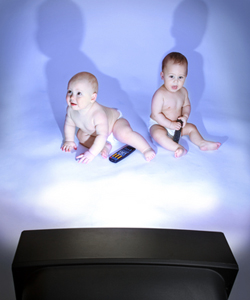 New findings about screen-time for babies and kids is something I keep a close eye on. As parent of an infant and a three-year-old, I want to do what’s best for them. And yet there’s always the temptation to use the television – “just one show” – when I need to get something done.
New findings about screen-time for babies and kids is something I keep a close eye on. As parent of an infant and a three-year-old, I want to do what’s best for them. And yet there’s always the temptation to use the television – “just one show” – when I need to get something done.
So I paid careful attention last month when the American Academy of Pediatrics recommended the first two years of life remain “as screen-free as possible.”
The full report, published in the journal Pediatrics, cited studies that educational programming for children is only beneficial if the children understand the context – a milestone typically not reached until after age 2. The report found that babies and toddlers learn best through unstructured play and interactions with older children and adults.
The report also found that children under age 2 who engage in heavy media use – more than an hour or two a day – may have delays in speech and language.
What does all of this mean?
Rachel Dunifon, a Human Ecology faculty member and expert in child and family policy, says that while research supports that idea that too much media use is likely not ideal for children, parents should know that the studies showing linkages between media use and child well-being are not causal, and that the specific time limits and age cut-offs are somewhat arbitrary.
While limiting media use is a great goal for parents, she says it is also important that parents not take these recommendations as another source of stress or guilt in their lives.
At our house, not a lot will change despite the new guidelines. We’ll continue to let our three-year-old watch up to an hour a day of an educational program – most often while the baby is napping. My husband and I will continue to reserve our own TV-viewing until after the kids go to bed – with some special exceptions like the Superbowl and the Royal wedding.
And yes, every once in a while, I’ll turn on Sesame Street and plunk both kids down in the living room so that I can get something done. But we’ll try our best to make that a rare exception.



I have read about this in other places and was not sure if it was really something that I had to worry about with my young twins. I guess I should do more research.